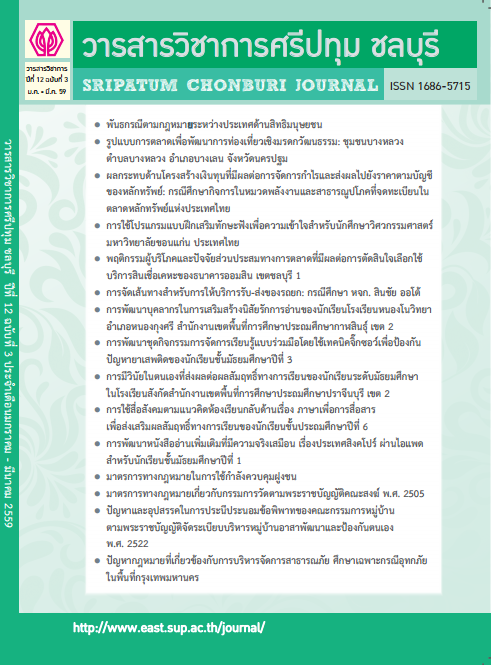การใช้โปรแกรมแบบฝึกเสริมทักษะฟังเพื่อความเข้าใจสำหรับนักศึกษาวิศวกรรมศาสตร์ มหาวิทยาลัยขอนแก่น ประเทศไทย INTEGRATING SUPPLEMENTARY LISTENING COMPREHENSION EXERCISES PROGRAM TO IMPROVE ENGINEERING STUDENTS’ LISTENING COMPREHENSION, KHON KAEN UNIVERSITY, TH
Keywords:
การฟังเพื่อความเข้าใจ, คอมพิวเตอร์ช่วยสอน, นักศึกษาวิศวกรรมศาสตร์, มหาวิทยาลัยขอนแก่น, listening comprehension, CALL, engineering students, Khon Kaen University.Abstract
บทคัดย่อ
วัตถุประสงค์ของงานวิจัย ได้แก่ 1) เพื่อศึกษาประสิทธิภาพของโปรแกรมเสริมการฟังภาษาอังกฤษเพื่อความเข้าใจของนักศึกษาวิศวกรรมศาสตร์ 2) เพื่อสำรวจว่าโปรแกรมเสริมการฟังภาษาอังกฤษเพื่อความเข้าใจของนักศึกษาวิศวกรรมศาสตร์ ช่วยพัฒนาความสามารถในการฟังเพื่อความเข้าใจของนักศึกษาในด้านใดบ้าง กลุ่มตัวอย่างที่ใช้ในการวิจัยคือ นักศึกษาวิศวกรรมศาสตร์ มหาวิทยาลัยขอนแก่น ชั้นปีที่ 2 ที่ลงทะเบียนเรียนในรายวิชา 411 323 ภาษาอังกฤษสำหรับวิศวกร ในภาคการศึกษาที่ 2 ปีการศึกษา 2556 จำนวน 30 คน ใช้วิธีเลือกสุ่มตัวอย่างแบบเจาะจง เครื่องมือที่ใช้ในงานวิจัย ได้แก่ 1) แบบสอบถาม 2) แบบทดสอบการฟังเพื่อความเข้าใจก่อนเรียนและหลังเรียน 3) แบบฝึกหัดเสริมการฟังภาษาอังกฤษเพื่อความเข้าใจ และ 4) แบบสัมภาษณ์ ผลการวิจัยพบว่าโปรแกรมแบบฝึกหัดเสริมการฟังภาษาอังกฤษเพื่อความเข้าใจ มีผลคะแนนการทดสอบหลังเรียนสูงกว่าผลคะแนนทดสอบก่อนเรียนอย่างมีนัยสำคัญทางสถิติที่ระดับ .000 และยังพบอีกว่าโปรแกรมแบบฝึกหัดเสริมการฟังภาษาอังกฤษเพื่อความเข้าใจกระตุ้นให้นักศึกษาเรียนรู้ภาษาอังกฤษและพัฒนาการฟัง รวมถึงบริบทในโปรแกรมเสริมการฟังสามารถช่วยให้ฟังเข้าใจมากขึ้น การออกแบบโปรแกรมในรูปแบบคอมพิวเตอร์น่าสนใจและมีประสิทธิภาพสำหรับการฝึกทักษะการฟังเพื่อความเข้าใจ
ABSTRACT
The purposes of the research were to determine the effectiveness of the supplementary listening comprehension exercises program and to investigate the students’ opinions towards the supplementary listening comprehension exercises program. The participants of the study comprised of 30 second-year engineering students who enrolled in 411 323 English for Engineers course in the second semester of the academic year 2013 in Khon Kaen University. The research instruments were 1) three questionnaires, 2) the pre- and post- listening comprehension tests, 3) the supplementary listening comprehension exercises program (SLCEP), and 4) the interview. The findings revealed that the pre- and the post- listening comprehension tests were significantly different at a level of .000. It could be explained that the SLCEP indeed helped the participants improve their listening comprehension skills. The participants also revealed that the program could motivate them to learn English and improve their listening comprehension. The familiar contexts included in SLCEP could help students to understand listening text better and SLCEP designed in a computerized program format was interesting and effective for listening comprehension practice.
Downloads
Published
Issue
Section
License
บทความทุกบทความเป็นลิขสิทธิ์ของวารสารวิชาการศรีปทุม ชลบุรี



